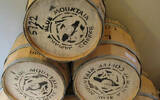Why is Kenyan coffee so sour? What is Kenya's K27 Treatment?
When it comes to sour coffee beans, many people will think of African coffee, in which Ethiopian and Kenyan coffee is the representative of African coffee, but there are obvious differences in the sour quality of coffee between the two countries. Ethiopia's acid is more refreshing and bright, while Kenya is thicker and stronger.
Why is Kenyan coffee so sour? In addition to benefiting from the country's rich natural resources, it is also affected by the K72 treatment known in the picture, as well as the main varieties of SL28 and SL34 coffee grown in the country.
Kenya is located in eastern Africa, most of the territory is a plateau with an average of 1500 meters, and is cut north and south by the eastern branch of the East African Rift Valley, dividing the highland into eastern and western parts, and there are many volcanoes along the line. one of the most famous is the extinct volcano Mount Kenya. The soil here is affected by volcanic ash and is rich in phosphoric acid, which makes the coffee here rich in fruit acidity.
Initially, Bourbon Bourbon was planted in Kenya, and Kent Kent and Jamaica Blue Mountain Iron pickup truck Typica were introduced, but none of them was ideal. Therefore, the variety selection was entrusted to Scott Agricultural Laboratory (Scott Laborotary). In the following four years, Kurt Agricultural Laboratory selected 42 coffee trees from different producing areas and studied their yield, quality, drought resistance and disease resistance. All the selected coffee species were prefixed with SL (Laboratory Democratic acronym), and SL28 and SL34 were one of the superior varieties. Today, however, Scott Lab has been renamed Kenya National Agricultural Laboratory (NARL), but the name and number of coffee varieties have been retained.
SL28 is a coffee variety found in a place called Tanganyika (now Tanzania), and genetic tests have confirmed that SL28 is related to the bourbon Bourbon genome. SL34 was selected from a coffee farm in the Kabete area near Nairobi, Kenya's capital, and genetic tests showed that SL34 was linked to the iron pickup Typica genome.
The planting characteristics of SL28 and SL34 are very similar. They both have the characteristics of high yield and easy to grow. They are suitable for planting in middle and high altitude areas and have complex and changeable acidity and flavor and remarkable citrus and black plum characteristics.
Although, the yields of these two varieties are not as large as before, and are vulnerable to viruses such as coffee leaf rust. At the same time, the Kenyan government has also made great efforts to promote the cultivation of coffee varieties with high yield and high disease resistance, such as K7 and Ruiru 11, but their flavor is not as unique and rich as SL28 and SL34. Therefore, many farmers in Kenya are still planting SL28 and SL34 varieties.
In addition to the unique variety of coffee, the Kenyan method of washing is also special. In the general water washing treatment, the fermentation time is rarely more than 36 hours, while the Kenyan water washing treatment is special in that the fermentation time is as long as 72 hours.
After the coffee farmers harvest, the high-quality coffee berries are selected by flotation, peeled and fermented for 24 hours, the pectin is cleaned after fermentation, and then fermented again in a clean pool for 24 hours, then the residual ingredients are cleaned up. Put it into a clean pool to ferment for 24 hours, and finally put it on a special steel rack to dry.
It can be fermented for 72 hours in three cycles, so this treatment is called Kenyan 72-hour fermentation water washing treatment, referred to as K72. Coffee beans fermented for a long time at low temperature can develop bright, clean, but full acidity and flavor.
Combining these conditions, Kenyan coffee is famous all over the world for its bright and complex raspberry sour aroma, sugarcane sweetness and juicy acidity, and is loved by many people in the coffee industry. Qianjie Coffee has a coffee bean from Salia Asail processing Plant in Sika, Kenya, selected SL28 and SL34 varieties, K72 washing treatment, brewed with virgin fruit and black plum flavor, bright acidity, outstanding sweetness, juicy taste and clean taste.

For more information about coffee producing areas, please scan the code directly and follow: coffee comments.
Long press the QR code to follow:
Important Notice :
前街咖啡 FrontStreet Coffee has moved to new addredd:
FrontStreet Coffee Address: 315,Donghua East Road,GuangZhou
Tel:020 38364473
- Prev

Immediate results?! Ruixing Coffee adds another "smooth artifact"?!
▲ Click to pay attention| Daily Boutique Coffee Culture Magazine Coffee Workshop is a "new talent" in the coffee industry. The frequency of updates of Lucky's products is obvious to all. Although old fans occasionally complain about the new works of the R & D team, as long as it comes to a new day for drinks, they will forget their previous experiences and compete to "walk through the minefield."
- Next

Indonesia plans to ban the export of raw coffee beans!
According to Indonesian media reports, during the BNI Investor Daily Summit in Indonesia held at the Jakarta Convention Center from October 8 to 9, 2024, President Joko Widodo proposed that the country is considering banning coffee
Related
- What grade does Jamaica Blue Mountain No. 1 coffee belong to and how to drink it better? What is the highest grade of Blue Mountain coffee for coffee aristocrats?
- What are the flavor characteristics of the world-famous coffee Blue Mountain No. 1 Golden Mantelin? What are the characteristics of deep-roasted bitter coffee?
- Can I make coffee a second time in an Italian hand-brewed mocha pot? Why can't coffee be brewed several times like tea leaves?
- Hand-brewed coffee flows with a knife and a tornado. How to brew it? What is the proportion of grinding water and water temperature divided into?
- What is the difference between Indonesian Sumatra Mantinin coffee and gold Mantinin? How to distinguish between real and fake golden Mantelin coffee?
- What does bypass mean in coffee? Why can hand-brewed coffee and water make it better?
- Unexpected! Ruixing Telunsu lattes use a smoothie machine to foam milk?!
- % Arabia's first store in Henan opens into the village?! Netizen: Thought it was P's
- Does an authentic standard mocha coffee recipe use chocolate sauce or powder? Mocha Latte/Dirty Coffee/Salty Mocha Coffee Recipe Share!
- What is the difference between Vietnam egg coffee and Norway egg coffee? Hand-brewed single product coffee filter paper filter cloth filter flat solution!

